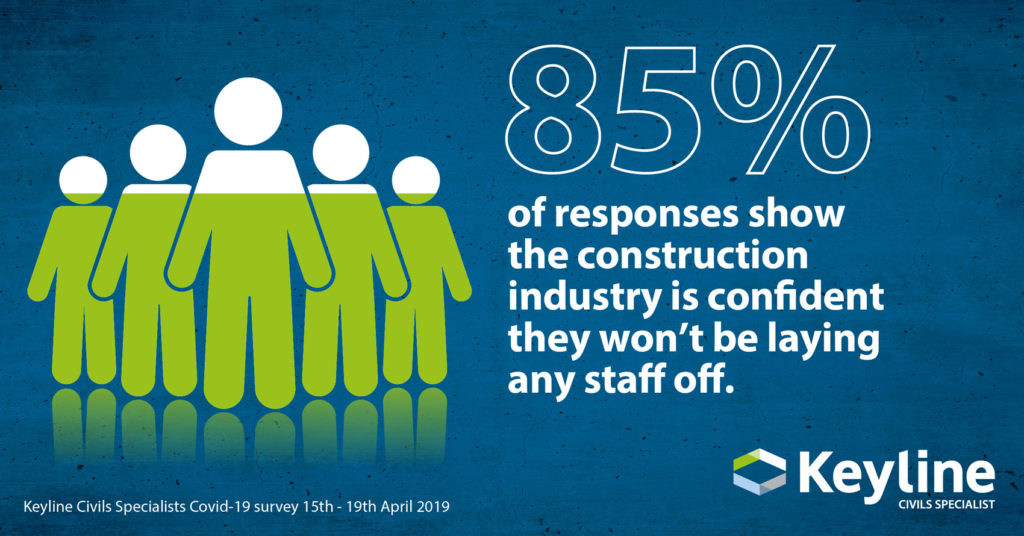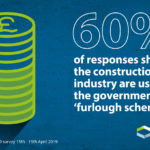In a recent survey, Keyline Civils Specialist asked how the construction industry is facing up to the challenges of the COVID-19 crisis. The results show a sense of optimism from an industry that has traditionally been, and remains today, resilient.
The research was carried out between 15th and the 18th April 2020, questioning business owners and contractors working in the housing, commercial, infrastructure, industrial, retail and public sectors.
The results indicate a general sense of optimism from within the construction sector, with the majority stating that they had not had to lay off staff and only a small proportion were seeking financial help from the Government.
The key findings from the survey include:
- 40% of participants reported that they had absences from their workforce due to sickness or self-isolation. Of those, 30% of participants stated that more than 30% of staff members are off work at present.
- 43% of companies felt that all employees are currently happy to work, with a further 30% stating they are ‘willing but concerned’. Less than 10% of participants said that their workforce was largely not willing to work at all, with the rest of participants stating that feelings are mixed amongst employees.
- With regards to government support, over 40% of companies have not needed to furlough staff, but conversely 36% stated that they have had to furlough more than 30% of their workforce.
- More encouragingly for the future of the construction sector, a large majority of the sample, as much as 85%, stated they have not had to lay off staff due to the crisis. Of the remaining 15%, only 7% stated they have had to lay off more than 30% of their workforce.
- This optimism is reinforced by the fact that a majority of the participants stated that they will not be applying to the government for the Business Interruption Loan and less than 16% said that they had already applied for the scheme.
- Sourcing supplies and working efficiently was overwhelmingly the biggest area for concern. Only 30% stated that they are still able to source products from existing suppliers. 75% claimed that they have had to resort to finding new suppliers in some or all cases due to shortages or shutdowns. However, there does seem to be a strong sense of community and understanding, with many contractors recognising that the health and wellbeing of counter and delivery staff needs to be safeguarded and as such many merchants have had no option but to close.
- Finally, when it comes to looking to the future of their businesses, 19% of participants see a similar or improved return for this year; but a significant 56% predict a reduction in revenue as a result of the COVID-19 crisis.
 Benchmarking against the recently commissioned British Chamber of Commerce survey, which found that one in three companies were planning to furlough at least 75% of their workforce, the results of the Keyline Civils Specialist survey illustrates that while efficiency has been affected, many construction sector companies are continuing to work. Although sickness has had an effect on the proportion of active workforce, the number of construction sector companies having to resort to either furloughing or laying off a significant number of staff is minimal at this time.
Benchmarking against the recently commissioned British Chamber of Commerce survey, which found that one in three companies were planning to furlough at least 75% of their workforce, the results of the Keyline Civils Specialist survey illustrates that while efficiency has been affected, many construction sector companies are continuing to work. Although sickness has had an effect on the proportion of active workforce, the number of construction sector companies having to resort to either furloughing or laying off a significant number of staff is minimal at this time.
While the majority of participants anticipated that the crisis would have an effect on their operations and revenue going forward, this sense of optimism with regards to employee retention and loan uptake, suggests that many prefer to work through the crisis with resilience and by relying on their own resources.
Uncertainty for the sector does look set to continue however, with Scotland cancelling all ‘non-essential’ construction work and the UK wide lockdown looking likely to be extended yet again.
While the Government is not making any commitment at this stage as to how it plans to kick start the economy again, we can look to those countries that have already partially softened their lockdown restrictions for an indication of how the UK may act. Spain for example, while one of the worst hit countries during the pandemic, is now allowing employees in some sectors to return to work, including those in manufacturing, construction and some services, as long as they adhere to strict safety guidelines.
With the construction industry contributing 7% of GDP, with an output of more than £110bn per annum[1], the sector has the capability to make a significant impact with regards to getting the UK economy back on its feet. If safe working practices can be implemented and maintained, especially on sites that have been temporarily shut, this might be a ray of hope for a sector that has traditionally been hit hard by recessions in both 1990 and 2009.
Furthermore, if the construction industry, working in housing, housing, commercial, infrastructure, industrial, retail and public sectors, is allowed to beginning working to full capacity again, it could be the key to boosting business and consumer confidence and lead the UK economy out of its present financial gloom.
[1] https://assets.publishing.service.gov.uk/government/uploads/system/uploads/attachment_data/file/61152/Government-Construction-Strategy_0.pdf









